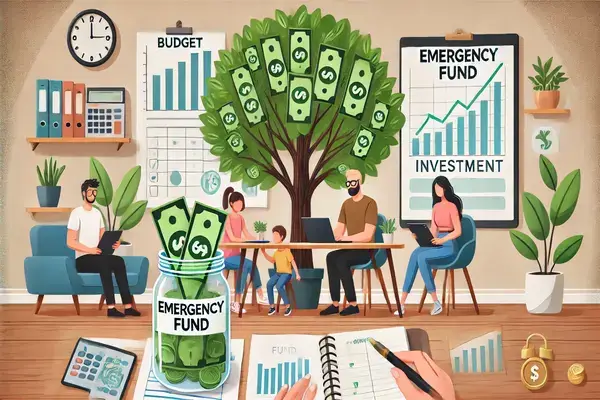
What are the 3 Steps to Managing Your Personal Finances?
So, if you know how to manage your money — this is crucial for your control and to avoid financial stress. No matter if you’re putting away savings for retirement, a big purchase, or generating income to tackle debt, it’s essential to know the gist of personal finance. Here’s one that breaks it down into blindingly clear, three simple steps that will help you take control of your money — with simple tips that you could implement today.
Key Takeaways
- Personal finance: budgeting, saving, investing.
- A clearer budget puts you in control of the expenses.
- Having savings means you have a buffer for life’s unplanned events and future objectives.
- Readon→ long-term: Investing is a key professor of wealth creation.
Understanding the Importance of Budgeting
However, budgeting is the core of financial management. There could be no proper management of money without knowing your income and expenses. An organized budget keeps you from overspending while preparing for your future.
Why is Budgeting Essential?
Provides data on spending habits: When you notice charges that you can live without, you can rein in that spending and spend money on more important things.
Prevent Debt: Sticking to a budget forces you to avoid credit cards or loans.
Aids you in reaching financial goals: Whether that’s planning for a trip or getting out of debt, a budget provides a path.
How to Make a Good Budget?
Monitor your income and expenses: Keep a log of all your sources of income and separate your expenses into two categories: fixed (rent, bills) and variable (leisure activities, food).
50/30/20 Rule: Split 50% of your money to needs, then 30% to wants, and finally 20% to savings or debt repayment.
Use the tools: While budgeting is inherently manual, there are apps like Mint or YNAB (You Need a Budget) that help automate tracking the budgeting process.
Even if you plan that new budget, don’t forget to review it monthly to adapt to changing life or unexpected expenses.
Building Savings for Security and Growth
The second important step is saving. It’s about accounting for planned expenses as well as unexpected emergencies.
Types of Savings to Focus On
Emergency Fund: Save 3 to 6 months of living expenses as an emergency fund. That sort of safety net can be comforting when something unexpected happens, like losing your job or becoming a victim of surprise medical billing.
Goal-Based Savings: If you already know that one day you want to go on a dream holiday or buy a ring, a house, saving enough leverage to reach that goal means you can do so debt-free.
Retirement Savings: To ensure a comfortable life in your retirement years, consider setting up a 401(k) or IRA account.
Why Saving Matters: A recent Bankrate survey revealed that 57% of Americans would find it challenging to cover an unexpected $1,000 expense.
Tips for Effective Saving
Implement automated savings: Set up recurring transfers to your savings account to ensure you save without forgetting.
Trim redundant expenses: Cancel subscriptions you rarely use or reduce non essential spending.
Earn more on your savings: Use high-yield savings accounts to start growing your savings sooner.
Investing to Grow Wealth Over Time
Step number three for managing your personal finances is investing. While saving keeps your money safe, investing helps it grow by potentially profiting from compounding returns. I encourage you to read more about this blog here: How Do I Teach Myself Personal Finance?
Why is Investing Important?
Protection against inflation: If you don’t invest, inflation will diminish the value of your savings over time.
Creates wealth in the long run: Compound interest accelerates growth, helping you achieve big goals like buying a house or retiring early.
Beginner’s Guide to Investing
For beginners, the best options are index funds or ETFs, so you can get diversified and aren’t paying a lot of fees. To do this, invest in different securities or classes of asset classes, such as bonds or real estate. Maximize retirement accounts — contribute to 401(k)s or IRAs and use their tax advantages.
Quote from a Financial Expert
“Investing isn’t about timing the market; it’s about time in the market.” – Warren Buffett
Pro Tip: Start investing as early as possible. Even small amounts grow significantly over time thanks to compounding.
Table: Quick Comparison of Savings vs. Investments
| Feature | Savings | Investments |
|---|---|---|
| Purpose | Short-term needs, emergencies | Long-term wealth growth |
| Risk Level | Low | Moderate to High |
| Return Rate | 0.5%-2% (Savings Accounts) | 7%-10% (Stock Market Average) |
| Accessibility | Highly Liquid | Limited (Depends on Asset Type) |
Visualize Your Financial Journey
Here are some AI-generated visuals to inspire you as you take charge of your personal finances.
- Budget Planning: A family reviewing their budget on a laptop, with charts and notes visible.
- Emergency Savings: A jar labeled “Emergency Fund” with a growing pile of coins.
- Investment Growth: A tree sprouting from a pile of money, symbolizing compounding wealth.
- Retirement Dreams: A serene beach scene representing financial freedom in retirement.
Conclusion
Three fundamental steps to taking charge of your financial future are: budgeting, saving, and investing. These are essential for building sustainable wealth! Get started with a simple budget, automatic savings, and education on basic investment options. When you start today small, you will secure financially tomorrow.
FAQ’s
Why is it important to manage personal finances?
Managing personal finances ensures you live within your means, avoid debt, and build wealth over time.
How do I start saving if I live paycheck to paycheck?
Begin with small amounts. Cut non-essential expenses and automate savings transfers, even if it’s just $10 a week.
What’s the best age to start investing?
The earlier, the better. Starting in your 20s allows you to take advantage of compounding returns over a longer period.
Should I focus on paying off debt before saving?
It depends on your interest rates. Prioritize paying off high-interest debt while maintaining an emergency fund.
Are budgeting apps worth it?
Yes! They simplify expense tracking and help identify spending patterns to refine your budget.
Learn More About What are the 3 Steps to Managing Your Personal Finances from makebetterfinance






